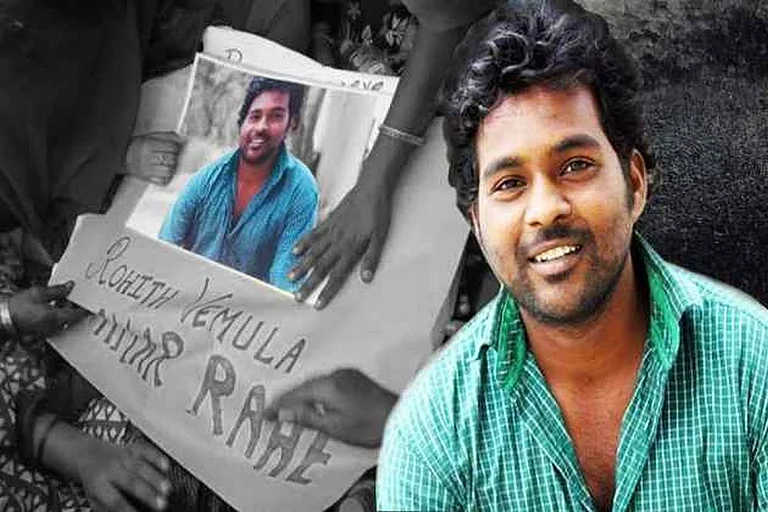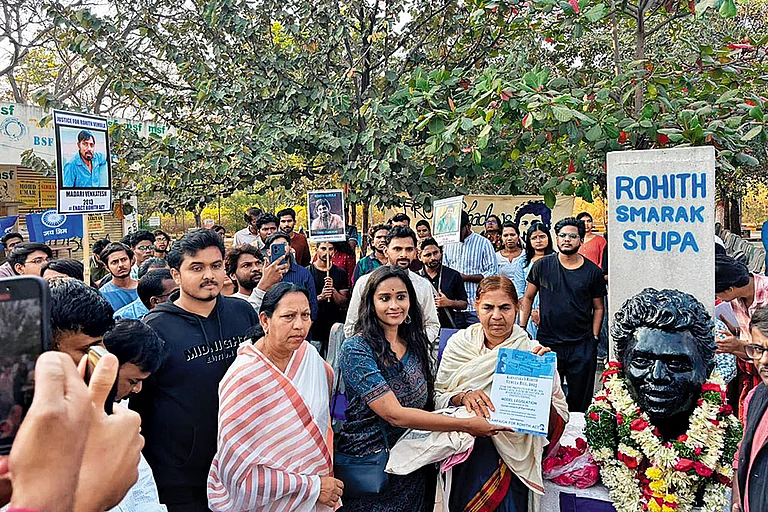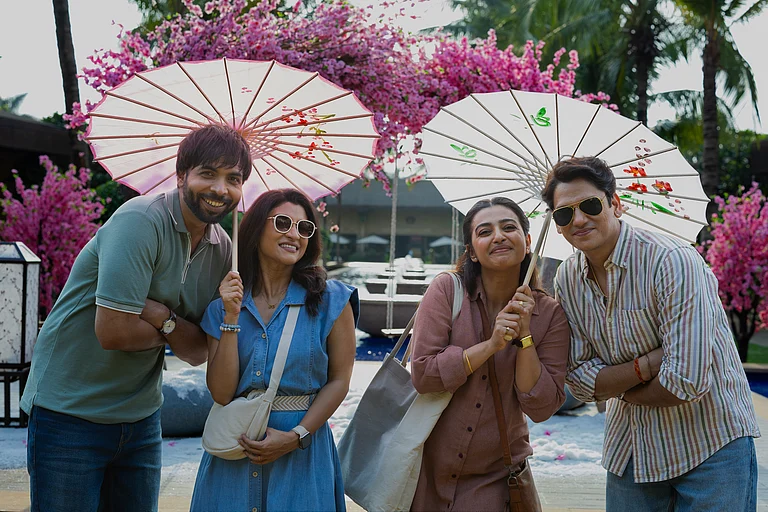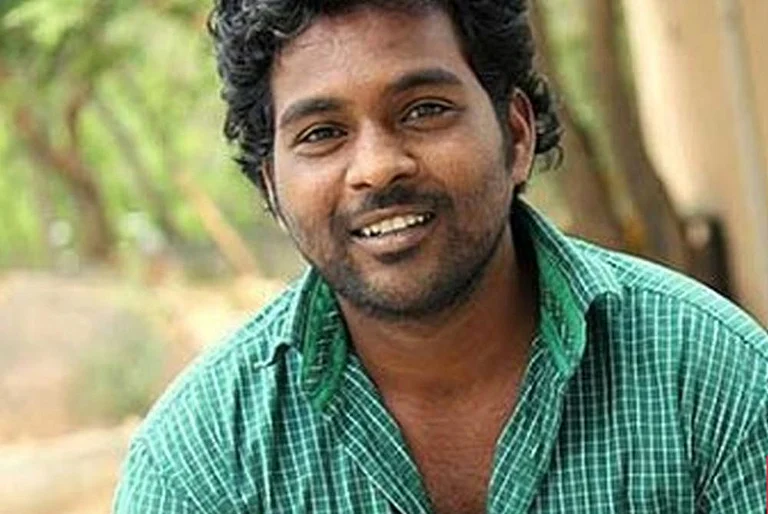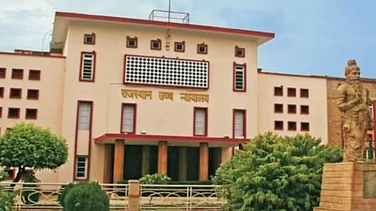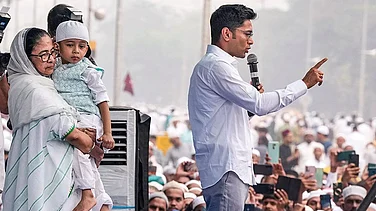“The rising day of justice, like a bribed person, favours only them/While we are being slaughtered, not even a sigh for us escapes their generous hands.” – From “Their Orthodox Pity” of Namdeo Dhasal, translated by Dilip Chitre
One is bound to recall these lines of Dhasal when one reads the closure report of Rohith Vemula suicide case submitted by Hyderabad Police. The report – prepared in 2018 and officially submitted in the jurisdictional court on March 21 this year – confirms the suspicion of many that the police investigation into the suicide of Vemula was carried out not to investigate the causes of his death but to ascertain his caste identity. The case has been closed giving a clean chit to the accused — University of Hyderabad Vice Chancellor P Appa Rao, Secunderabad MP Bandaru Dattatreya, MLC N Ramchender Rao, and Union Minister Smriti Irani. The report says, "Despite best efforts, no evidence could be found to establish that the actions of the accused have driven the deceased to commit suicide.” True that the Deputy Commissioner of Police (Madhapur Division, Hyderabad Police) Dr G Vinneth has promised to appeal to the court to re-examine the case and said that “the mother and brother of the deceased have expressed some doubts and concerns and we will ensure their side is also heard and investigated so that they do not feel aggrieved.” Yet, one apprehends that justice could well be bribed again by those in power.
How was the investigation carried out? First, heads of a few institutions in which Rohith Vemula studied were enquired. Then statements of Rohith’s father and grandparents, and the sarpanch of Gurazala town where they live were also recorded. B Kondaiah, the then principal of ARRJ college, told the investigating officer that Rohith had submitted a certified copy of the certificate issued by his previous principal stating that he was from the Mala Scheduled Caste. The principal of Hindu College in Guntur also provided records that proved Rohith to be an SC. Rohith’s father Vemula Naga Mani Kumar and grandfather Venkateshwarlu, however, informed the IO that they belong to the Vaddera community, and that Rohith’s mother Radhika Banala was also from a Vaddera family. The report says, “They stated that they are not aware as to why Vemula Radhika is claiming her caste as SC when she was a born Vaddera.” One really wonders why Radhika claims herself to be an SC? Thereby hangs a tale.
Immediately after Rohith’s suicide, Radhika’s mother Banala Anjani Devi told a reputed Indian daily that “she had adopted Radhika from an SC Mala couple who were railway construction workers.” Anjani Devi, who was a retired school headmistress indeed was from the backward Vaddera community, also said that Radhika had been tortured by her husband when he came to know about her Mala caste affiliation. To quote Anjani Devi, “Somebody in our Vaddera colony in Prashanth Nagar leaked the secret to him [Mani, Radhika's husband] that Radhika is an adopted Mala girl. That’s when he started beating her very badly.” Confirming this, Radhika also said “Mani was always abusive. But after he discovered my caste, he became even more violent. He would beat me almost every day and curse his luck for being cheated into marrying an untouchable.”
Radhika's marriage was indeed a broken marriage and she lived separately from her husband for a long time. Ajani Devi even told the reporter who interviewed her that Radhika “decided to revert to her original Mala caste after her marriage turned sour and she became estranged from her husband.”
The IO could not record Anjani Devi’s statement as she passed away on February 23, 2016, almost within a month after Rohith’s suicide. But was any attempt made by the IO to consider the facts stated above, facts which were very much in circulation and public knowledge? The answer is, No. The report of Hyderabad Police seems to heavily rely upon the report of Justice Ashok Kumar Roopanwal commission, which was formed by the HRD Ministry to investigate Rohith’s death. Hyderabad police has literally quoted from Roopanwal commission's report in chunks. Quoting the commission’s report, the closure report of the police says, “It was wholly a decision of his own…He was feeling frustrated for reasons best known to him. He did not blame anybody for his suicide. If he would have been angry with the decision of the university, certainly he would have written specific words or would have indicated in this regard.” While making this claim, the report bypasses a letter written by Rohith to the Vice-Chancellor of Hyderabad Varsity on December 18, 2015 asking for poison and a rope to commit suicide.
Referring to the letter, the report claims, “If examined whether this can be an indication for his suicide, this letter was written a month in advance and the disappointment, anger with which it might have been written must have died down with the lapse of time.” Logic could not be, indeed, funnier than this. How safely the police has conjectured that the disappointment and anger with which the letter had been written by Rohith died down within a month!
The report has spared a significant portion on Rohith’s suicide letter. The scrutiny of the letter has led the police to the following ridiculous observation: “The deceased was disappointed and unhappy over his childhood; The deceased seemed to be unhappy with the organisations with which he worked; The deceased also seemed to be under severe depression and disappointment; It appears that he was involved more in student political issues in the campus rather than in his studies; The deceased himself is aware that he does not belong to Scheduled Caste and that his mother got him SC certificate, and it could be one of the constant fears as the exposure of the same would put him to loss of his academic degrees that he earned over the years and be compelled to face prosecution.” Nobody knows how the police came to know that Rohith was fearing that the world might know that he was not a Dalit! Hyderabad police have really been able to prove how insensitive the state repressive apparatus could be to the dreams and aspirations of a young citizen of the country. They have indeed murdered Rohith Vemula a second time by reading his letter – which has already been acknowledged by the social scientist and the intellectuals across the globe as one of the most poetic, sensitive and touching documents of unfulfilled dreams – in the most insensitive way.
One should, however, point out that a District Level Scrutiny Committee set up by the Guntur District Collector to investigate whether the SC certificates issued to Radhika and her children were authentic recommended cancelling them since they, according to the committee, were fraudulently obtained. The committee also declared that Radhika and her children were from the Vaddera community, falling under BC-A caste. The question is: can the committee make a declaration like this particularly when it is evident from Anjani Devi's statement that Radhika was an SC? What is the legal provision in this regard? In a January 2012 judgment, Justices Aftab Alam and Ranjana Prakash Desai of the Supreme Court opined that there is no “inflexible rule of general application” that in case of an inter-caste marriage in which the mother belongs to an SC/ST community, the child has to take his father’s caste.
The bench further clarified the statement saying, “It is open to the child of such marriage to lead evidence to show that he/she was brought up by the mother who belonged to the Scheduled Caste/Scheduled Tribe. By virtue of being the son of a forward caste father he did not have any advantageous start in life but on the contrary suffered the deprivations, indignities, humilities and handicaps like any other member of the community to which his/her mother belonged. Additionally, that he was always treated as a member of the community to which her mother belonged not only by that community but by people outside the community as well.” Needless to say that Rohit’s suicide letter as well as the letter written to the Hyderabad Varsity Vice-Chancellor in December 2015 unquestionably proved that all through his life he suffered the deprivations, indignities, humilities and handicaps like any other member of the Mala community. Riyaz, the best friend of Rohit, in one of his interviews, also stated that Rohit and his siblings had to live like untouchables in Anjani Devi's house, their shelter after they were abandoned by their father. Protesting against the findings of the Roopanwal commission, Rohit's brother Raja had already put it on record that they lived like Dalits, “We lived like Dalits. We were raised in a Dalit community. Yes, my father was from a backward class, but whatever we know is from our experience of living like a Dalit. We have been discriminated against all our lives. Rohith referred to this in his letter too.” Thus, the recommendation of the District Level Scrutiny Committee of the Guntur District Collector is not legally binding.
Rohith Vemula's suicide is a black spot in the history of post-Independent India which no amount of whitewashing by the state can erase. No perfume from Arabia will ever be able to sweeten the foul smell that this wound spreads. It will always be visible to tell us that something has got rotten in the state of India.
Time has indeed come to raise our voice again in favour of Rohith. Rohith did not get justice. His family could.
Angshuman Kar is professor of english and cultural studies and director, centre for Australian studies at the university of Burdwan, India
(Views expressed are personal)







